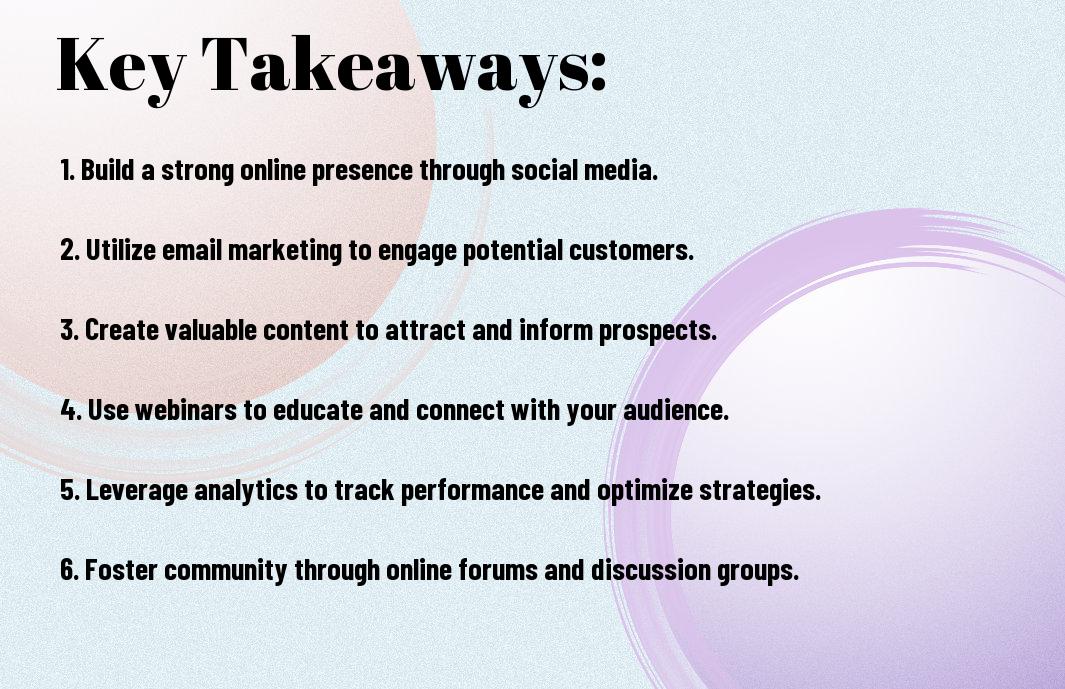Many marketers are discovering the power of online tools to elevate their network marketing efforts. By utilizing these resources effectively, you can expand your reach and enhance your customer engagement. It’s crucial to choose the right platforms to connect with your audience while avoiding potential pitfalls like misinformation and over-promotion. To ensure you’re on the right track, check out these 4 Steps to Leveraging Your Network to Build Your Business. Implementing these strategies can lead to sustainable success in your marketing journey.
Key Takeaways:
- Social Media Platforms: Utilize platforms like Facebook, Instagram, and LinkedIn to connect with potential clients and build your network.
- Email Marketing: Implement targeted email campaigns to nurture leads and deliver valuable content that encourages engagement.
- Content Creation: Create high-quality content that educates and informs your audience, establishing you as an authority in your niche.
- Webinars and Live Streams: Host interactive events to showcase your products and services while building trust with your audience.
- Analytics Tools: Use analytical tools to track your performance, optimize strategies, and measure the effectiveness of your online activities.

Understanding Network Marketing
Before exploring into the intricacies of network marketing, it’s imperative for you to grasp its foundational elements. Network marketing, often referred to as multi-level marketing (MLM), revolves around individuals selling products or services directly to consumers while simultaneously recruiting others to join their sales force. This creates a network where sales are made not just through your efforts, but also through the efforts of those you recruit. By understanding the structure, you can leverage your position and potential earnings more effectively.
Definition and Key Concepts
Network marketing is defined by its unique business model, which relies heavily on personal relationships and community engagement. You operate not just as a salesperson but also as a leader who nurtures and guides your recruits. Each member in the network earns commissions based on their sales and the sales of their recruits, creating a potential for passive income if your network expands. Key concepts include downlines (the recruits you bring on), uplines (the individuals who recruited you), and rank advancement (moving up the tiers within the network for increased earning potential).
The Importance of Online Tools
Online tools have transformed the landscape of network marketing, providing you with innovative avenues to connect with prospects and manage your business more efficiently. Through social media platforms, email marketing, and CRM software, you can significantly enhance your outreach. These tools enable you not only to market your products but also to build relationships, streamline your communication, and maintain the engagement of your network. In a world where digital interactions are paramount, embracing these tools is no longer optional but is a vital part of your marketing strategy.
Another significant advantage of utilizing online tools is their role in tracking performance metrics. You can monitor sales data, engagement rates, and recruitment success efficiently, allowing you to make informed decisions for your strategy moving forward. With the right tools, you empower yourself to identify trends, engage with your audience effectively, and ultimately maximize your earnings potential in network marketing. Embracing technology provides you with a competitive edge, making it easier to build your brand and network.

The Role of Social Media in Network Marketing
Any successful network marketing strategy today must include a strong social media presence. The digital landscape offers you an unparalleled opportunity to connect with potential customers and team members from around the globe. Social media platforms serve as vital touchpoints where you can share insights about your products, promote your business, and foster relationships that can lead to increased sales and recruitment. With the right approach, you can transform your social media efforts into a powerful tool for expanding your network.
Choosing the Right Platforms
Any network marketer must be strategic when selecting the social media platforms that align best with their target audience. Each platform has its unique demographics and strengths, so it’s important to focus your efforts where your audience spends the most time. For instance, if your products appeal to a younger demographic, platforms such as Instagram and TikTok may be most effective. Conversely, for a more professional audience, LinkedIn could be the ideal space to engage.
Moreover, consider the nature of your content and how it fits within each platform’s framework. Facebook is excellent for sharing longer posts, engaging in group discussions, and organizing events, while Twitter caters to brief updates and real-time interactions. By analyzing your target audience’s online behavior and knowing your product’s strengths, you can maximize your network marketing efforts across the right channels.
Creating Engaging Content
By crafting content that resonates with your audience, you can significantly boost your engagement levels. This means going beyond promotional materials to include valuable and relatable posts that inform, entertain, or inspire your followers. Use high-quality visuals, engaging stories, and practical tips related to your products or services. This variety keeps your content fresh and your audience invested, leading to a stronger connection with your brand.
Consequently, staying ahead in the fast-paced world of social media requires you to keep up with the latest trends and adapt your content strategy accordingly. Regularly assess your engagement metrics to identify what types of content perform best and make informed decisions about future posts. Always be open to experimenting with different formats like live videos, polls, and user-generated content to see what resonates most with your audience, ensuring that your messaging remains relevant and engaging.
Building a Community Online
By leveraging social media to create an online community, you empower your network marketing efforts significantly. When you foster a sense of belonging among your followers, they are more likely to engage with your content and become loyal customers. Hosting discussions, responding to comments, and initiating conversations can help create an atmosphere of trust and support. This builds relationships that go beyond mere transactions and taps into the emotional aspects of network marketing.
Engaging with your community further strengthens these connections, as it encourages dialogue and collaboration among its members. Hosting challenges, offering exclusive promotions, and sharing user success stories can transform your social media presence from a one-way marketing channel into a vibrant space for interaction and support. By fostering this type of online environment, you not only enhance your brand’s visibility but also cultivate an enthusiastic base of advocates who share your mission and products with their own networks.
Utilizing Email Marketing Campaigns
Once again, email marketing proves to be a powerful tool in your network marketing arsenal. By effectively utilizing email campaigns, you can establish connections with your audience, promote your products, and ultimately boost your sales. The key to success is in the careful crafting of your messages and understanding your audience’s preferences and behaviors. This strategic approach ensures that your emails stand out in crowded inboxes and encourage engagement.
Crafting Effective Email Messages
Between the subject line and the closing signature, every component of your email must be strategically planned. Start with an eye-catching subject line that draws readers in; this is your chance to make a strong first impression. Your email should include a clear and engaging message that speaks directly to the reader’s needs and interests. Personalization is a powerful technique here—use the recipient’s name and tailor the content to address their specific pain points.
Additionally, keep your messages concise and focused. Overloading your emails with too much information can overwhelm your readers. Instead, aim for a clear call-to-action that guides them on the next steps, whether that’s visiting your website, joining a webinar, or purchasing a product. Make sure to include relevant visuals and branding elements to reinforce your identity and entice the reader further.
Segmenting Your Audience
One of the most effective strategies in email marketing is segmenting your audience based on their interests, behaviors, and demographics. By categorizing your subscribers into different segments, you tailor your messaging to resonate more deeply with each group. For example, you could create segments for new subscribers, loyal customers, and those who have shown interest in specific products but haven’t purchased yet.
The goal of segmentation is to enhance the relevance of your content for each group. When your emails speak directly to the interests of your audience, you increase engagement rates considerably. Personalized messages are more likely to be opened and acted upon, ultimately leading to higher conversion rates for your marketing campaigns.
Analyzing Email Campaign Performance
With your email campaigns deployed, the next step is to analyze your performance metrics. Track open rates, click-through rates, and conversion rates to gauge how well your emails are performing. Understanding these numbers provides valuable insight into what works and what doesn’t, allowing you to make informed adjustments to your strategy as needed.
Furthermore, pay attention to factors like unsubscribe rates and spam complaints. A rising unsubscribe rate may indicate that your content is not resonating with your audience, prompting you to reevaluate your messaging or frequency of emails. The ability to adapt your approach based on this performance analysis will enable you to fine-tune your email marketing and ultimately enhance your network marketing effectiveness.
Harnessing the Power of SEO
For anyone involved in network marketing, understanding how to leverage the digital landscape is important. One of the most important aspects of this is Search Engine Optimization (SEO), which helps improve your online visibility and drives organic traffic to your offerings. By optimizing your content for search engines, you can ensure that potential customers find you when searching for the products or services you provide.
Understanding Search Engine Optimization
The world of SEO can seem daunting at first, but it fundamentally revolves around enhancing your online content so that search engines like Google can easily understand and rank it. It encompasses a variety of strategies, such as keyword research, on-page optimization, and acquiring backlinks. By utilizing these techniques effectively, you can boost your website’s authority and relevance, leading to increased traffic and sales.
Moreover, understanding the algorithms used by search engines is vital. These algorithms decide how content is ranked, meaning that if you stay informed about updates and changes, you can adapt your strategy accordingly. SEO is an ongoing process, and being proactive can significantly benefit your network marketing efforts.
Implementing SEO Strategies for Your Business
An effective SEO strategy for your network marketing business begins with comprehensive keyword research. Identify the terms and phrases your potential customers are using to search for products or services like yours. Once you have a robust list of relevant keywords, incorporate them into your website’s content, meta tags, and URLs to improve visibility. Balance is key; ensure your content remains valuable and engaging, while also optimized for search engines.
Additionally, consider optimizing your website’s loading speed and mobile responsiveness. With a growing number of users accessing content via mobile devices, ensuring that your site offers a seamless experience on various platforms can significantly influence your search rankings. Don’t overlook the power of quality backlinks as well; developing relationships with other reputable websites can elevate your credibility and authority.
Power lies in understanding that SEO is as much about user experience as it is about search engines. When users find value in what you offer, they are more likely to share, link, and return to your website. This not only improves your search engine rankings but also helps in building a loyal customer base, enhancing your overall network marketing success.
Tracking SEO Results
Search engine optimization is not a “set it and forget it” system; tracking your SEO results is important to ensure your efforts are paying off. Use tools like Google Analytics and Google Search Console to monitor your website’s performance. Keep an eye on metrics like organic traffic, bounce rates, and conversion rates to gauge the effectiveness of your strategies.
By assessing these metrics regularly, you can identify what’s working and what needs improvement. Making data-driven decisions empowers you to fine-tune your approaches and create a dynamic plan that adapts to the changing landscape of online marketing.
Harnessing the metrics related to SEO not only showcases your efforts but also provides insight into your audience’s behavior. Understanding how visitors interact with your content allows you to refine your offerings further, enhancing your market reach and bolstering your network marketing goals.
Creating and Distributing Valuable Content
Now more than ever, creating and distributing valuable content is vital for your success in network marketing. By providing information that addresses the pain points and interests of your target audience, you can build trust and establish yourself as an authority in your niche. The key lies in consistently offering insightful material that resonates with your audience, encouraging them to engage with your brand and share your message with others.
Blogging for Network Marketing Success
Against the common notion that blogging is a thing of the past, it remains one of the most effective tools for your network marketing strategy. By maintaining a well-structured blog, you can share your expertise, answer frequently asked questions, and provide valuable insights that can help your audience make informed decisions. Regular blog posts can create a dialogue with your audience, allowing them to see your personality and expertise shine through, which ultimately drives more traffic to your network marketing efforts.
Engaging in your niche allows you to not only promote your products but also educate your audience about the benefits they provide. By leveraging SEO techniques, such as incorporating relevant keywords, you can increase your visibility online, drawing in potential customers and cultivating relationships that may lead to future sales. A well-curated blog is not merely an extension of your marketing strategy—it is a genuine tool for relationship-building.
Utilizing Video Content
On the other hand, utilizing video content can significantly enhance your network marketing success. Videos allow you to visually showcase your products, share testimonials, and provide valuable tips that resonate more deeply with your audience than text alone. With platforms such as YouTube and social media channels, video content can be disseminated widely, creating a viral effect that can elevate your brand’s presence. By being authentic and relatable in your videos, you can foster a genuine connection that resonates more profoundly with viewers.
Video content not only attracts attention but also keeps users engaged longer compared to static content. Crafting short, informative videos that highlight your offerings or answer common queries can serve as a strong addition to your marketing strategy. Furthermore, you can consider leveraging live streams for real-time interaction with your audience, which fosters a sense of community and immediate trust.
Developing E-books and Guides
Across various marketing channels, developing e-books and guides can be a powerful strategy for your network marketing success. These comprehensive resources not only showcase your knowledge and expertise but also provide immense value to your audience. By addressing specific topics that are relevant to your niche, you create a sense of credibility that can attract leads to your business. Offering these materials in exchange for email subscriptions can also be an excellent way to build an email list that you can nurture over time.
Creating e-books and guides allows you to dive deep into subjects relevant to your audience, establishing your authority and making it easier for potential customers to see the benefits of your products or services. These formats can be easily shared across your social media platforms or through email marketing, expanding your reach and generating interest in your business.
Blogging allows you to create a collection of knowledge that can be formatted into an e-book or guide. By compiling relevant blog posts, tips, and insights, you can repurpose your content while providing a comprehensive resource that your audience will find valuable. This strategy not only showcases your expertise but also encourages your audience to view you as a trusted resource, ultimately driving sales and growth in your network marketing efforts.
Leveraging Online Networking and Collaboration Tools
Unlike traditional networking methods, online networking and collaboration tools provide you with a versatile platform to connect with others. These tools not only facilitate easy communication but also allow for broader reach and engagement across different geographic locations. If you’re curious about specific tools that can enhance your network marketing efforts, you can check out What are the best online tools for network marketers?
Benefits of Online Collaboration
Around the globe, businesses and individuals are adopting online collaboration tools to enhance their productivity and communication. By harnessing these tools, you can enjoy enhanced flexibility and convenience. The ability to communicate in real-time ensures that you and your connections can share ideas instantaneously, reducing delays and eliminating barriers that often come with traditional networking.
Additionally, online collaboration tools often provide a centralized platform for resource sharing, brainstorming, and decision-making. This integration can increase your efficiency and effectiveness in nurturing leads and managing relationships over time. Ultimately, it reflects a shift towards a more inclusive and resourceful approach to networking.
Best Tools for Networking
The variety of online tools available for networking can seem overwhelming, but some stand out for their effectiveness in empowering your network marketing strategy. Platforms like Zoom, Slack, and LinkedIn are designed to facilitate both one-on-one and group interactions. These tools help you establish contact, share valuable content, and maintain a consistent presence within your targeted audience.
Networking tools not only help you connect with prospective clients but also assist in building a community around your brand. By leveraging such platforms, you can host webinars, create discussion groups, and provide valuable insights. This not only establishes your authority in the industry but also fosters trust with your audience.
Building Partnerships through Virtual Means
Collaboration in the virtual space opens up numerous possibilities for building significant partnerships that can accelerate your success in network marketing. By utilizing networking tools, you can engage with potential partners in a more dynamic and interactive way, breaking geographical constraints that might have previously hindered collaboration.
With the right approach, not only can you grow your network, but you can also foster long-lasting partnerships that are mutually beneficial. Whether it’s through joint ventures, affiliate marketing, or collaborative content creation, utilizing online platforms for networking positions you as a proactive and innovative player in your field.

Analyzing and Adapting Your Strategy
All successful network marketers understand the importance of constantly evaluating their strategies. Leveraging online tools provides you with the ability to gather valuable data, enabling you to make informed decisions about how to enhance your approach. Through careful analysis, you can identify patterns and trends that will eventually lead to more effective marketing strategies. Moreover, analyzing your performance metrics allows you to spot areas for improvement, optimizing your efforts for better results in your network marketing endeavors.
Key Metrics for Online Tools
Any effective online marketing strategy requires you to track specific key metrics. These might include conversion rates, engagement levels on your social media platforms, and the performance of your email campaigns. By focusing on these metrics, you gain insight into which aspects of your marketing strategy are yielding the best returns and which may need reworking. Additionally, tools like Google Analytics and social media insights can provide you with a clearer picture of how your audiences are interacting with your content, thus helping you to tailor it to their preferences.
Adapting to Feedback and Trends
Against the backdrop of shifting market conditions, it’s vital to be flexible and responsive to feedback from your audience. Customer feedback can spotlight what works and what doesn’t, giving you a roadmap for potential enhancements to your approach. Monitoring social media trends, industry developments, and competitor activities can also prove invaluable, as they all contribute to shaping your marketing strategy. By keeping yourself informed and able to pivot quickly, you position your network marketing efforts for sustained success in a fast-paced digital landscape.
Even if you find that your current strategy is yielding positive results, do not become complacent. Continuous adaptation to feedback and emerging trends should be a priority. Regularly updating your tactics not only helps in meeting the evolving needs of your customers but also keeps your brand relevant in a highly competitive environment. Staying attuned to your audience’s preferences and behaviors ensures that your marketing efforts remain effective, ultimately leading your network marketing operations towards increasing success.
Summing up
Ultimately, leveraging online tools for network marketing can significantly enhance your outreach and engagement. By utilizing social media platforms, email marketing, and other digital resources, you can connect with potential clients and partners in unprecedented ways. These tools allow you to not only expand your network but also build relationships founded on trust and value, which are imperative elements in the world of network marketing. By incorporating these strategies into your approach, you can create a more dynamic and effective marketing plan.
Furthermore, as you explore these online tools, it’s important to stay adaptable and open to new ideas. The digital landscape is constantly evolving, and your willingness to learn and experiment will be key to staying ahead of the competition. By consistently refining your approach and measuring your results, you can identify what works best for your unique business goals. In this ever-changing environment, your proactive engagement with online tools will empower you to maximize your network marketing success.
FAQ
Q: What are some effective online tools for network marketing?
A: There are numerous online tools that can enhance network marketing efforts. Social media platforms like Facebook, Instagram, and LinkedIn can help connect with potential leads. Email marketing services such as Mailchimp or Constant Contact enable effective communication with prospects. Additionally, webinars and virtual meeting platforms like Zoom can facilitate presentations and training sessions. CRM tools like HubSpot or Salesforce assist in managing relationships and tracking interactions with potential customers.
Q: How can social media be utilized in network marketing?
A: Social media offers a dynamic platform for network marketers to engage with their audience. By consistently posting valuable content, such as tips, testimonials, and promotional materials, marketers can build brand awareness and trust. Engaging in conversations, responding to comments, and using targeted ads can also expand reach and drive traffic to landing pages or websites, ultimately increasing leads and sales.
Q: What role does content marketing play in network marketing?
A: Content marketing is vital in network marketing as it helps establish authority and build relationships with potential clients. By creating and sharing informative blog posts, videos, or infographics related to the products or industry, marketers can provide value and educate their audience. This approach not only attracts leads but also encourages sharing, creating a wider reach. Consistent, quality content can also improve SEO, helping to increase visibility in search engines.
Q: How important is email marketing for network marketers?
A: Email marketing remains a powerful tool for network marketers. It allows for direct communication with leads and customers, offering personalized content and promotions. Building an email list lets marketers nurture relationships over time, sharing valuable information and updates. Regular newsletters can keep the audience engaged, and tailored campaigns can lead to higher conversion rates as customers feel more connected to the brand.
Q: What strategies can enhance online teamwork in network marketing?
A: Effective teamwork in network marketing can be fostered through various online strategies. Utilizing project management tools like Trello or Asana facilitates task assignment and progress tracking. Communication tools like Slack or Microsoft Teams allow for seamless collaboration and instant messaging. Regular virtual meetings can help maintain alignment on goals and strategies. Additionally, shared resources and training materials can empower team members to work more effectively together.



